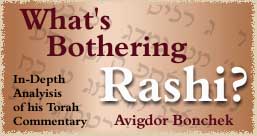

Back to this week's Parsha | Previous Issues
Parashas Balak
Last week we asked about the Rashi on verse 20:15.
RASHI A Question: What is Rashi telling us that we wouldn't know from the verse itself? What is his point? An Answer: This verse can be understood in one of two different ways. The claim that "the Egyptians did us evil" may mean to convey: 1) The Egyptians were evil people. 2) The Israelites suffered at their hands. Rashi tells us that meaning #2 is the message that Moses is sending to the king of Edom, and not #1. Certainly Moses doesn't want to blame the "goyim." What would the king of Edom think the Israelites think of them? No, Rashi says, Moses was only letting Edom know how much suffering the Israelites had gone through, hoping that he would respond with understanding and sympathy. With our hindsight of the travails of Jewish history we can see how naive this was. Edom responded as could be expected. He refused the peaceful request by a silent threat of war. Now to this week's sedra Parashas Balak With your permission I will ask a question on the Torah and not on Rashi. A question I have not seen asked by the commentaries, but one that is puzzling nevertheless. Ch. 22:18 Bilaam refuses to go with messengers of Balak and he says: "If Balak will give me his house full of silver and gold I am not able to transgress the word of Hashem my G-d to do even a small thing or a big thing." Later after Bilaam in fact does go to curse the Jewish people but fails Balak balls him out In verses 24:12,13 Bilaam defends himself. He says: "Didn't I also tell your messengers which you sent saying: If Balak will give me his house full of silver and gold I am not able to transgress the word of Hashem to do either good or evil from my own heart, that which Hashem will speak that I will speak." Compare the two verses. Very similar, right? But not exactly. If Bilaam remembered so well what he had said originally, why did change the words "even a small thing or a big thing" to "good or evil" ? Your Answer: Next week IY'H we'll suggest an answer.
Back to this week's Parsha | Previous Issues
|